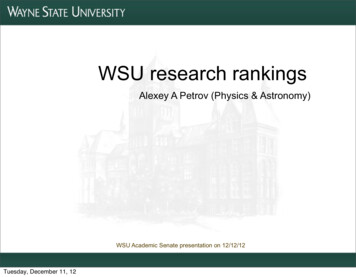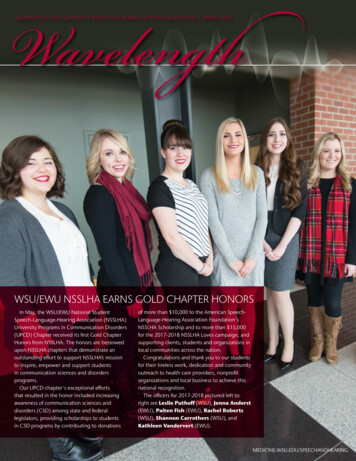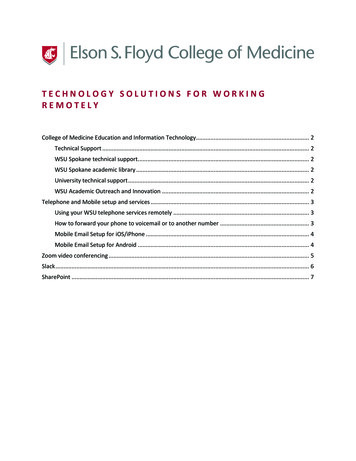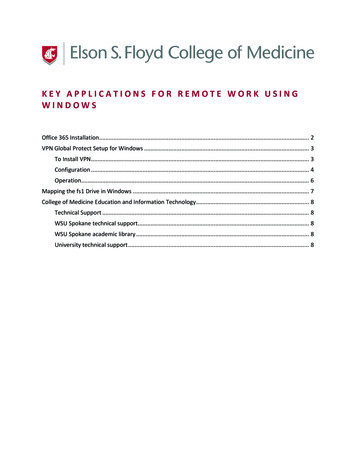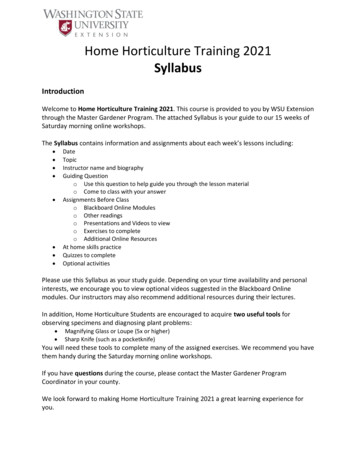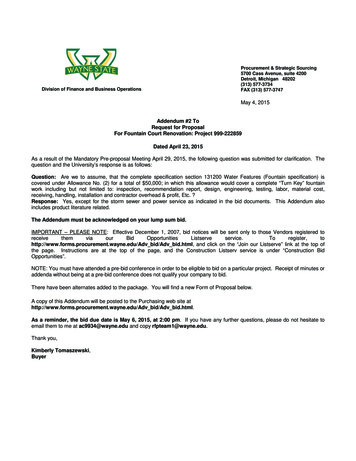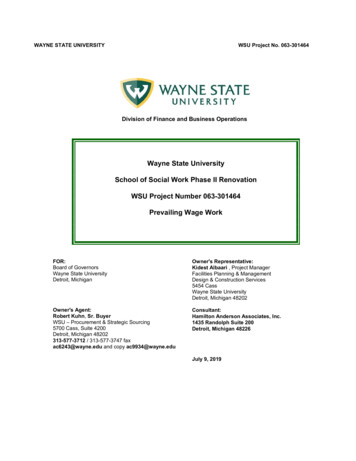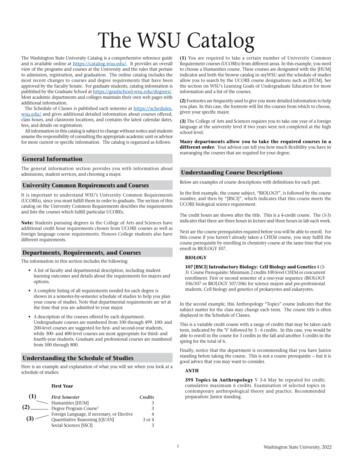
Transcription
The WSU Catalog(1) You are required to take a certain number of University CommonRequirement courses (UCOREs) from different areas. In this example, you needto choose a Humanities course. These courses are designated with the [HUM]indicator and both the browse catalog in myWSU and the schedule of studiesallow you to search by the UCORE course designations such as [HUM]. Seethe section on WSU's Learning Goals of Undergraduate Education for moreinformation and a list of the courses.The Washington State University Catalog is a comprehensive reference guideand is available online at https://catalog.wsu.edu/. It provides an overallview of the programs and courses at the University and the rules that pertainto admission, registration, and graduation. The online catalog includes themost recent changes to courses and degree requirements that have beenapproved by the Faculty Senate. For graduate students, catalog information ispublished by the Graduate School at https://gradschool.wsu.edu/degrees/.Most academic departments and colleges maintain their own web pages withadditional information.The Schedule of Classes is published each semester at https://schedules.wsu.edu/ and gives additional detailed information about courses offered,class hours, and classroom locations, and contains the latest calendar dates,fees, and details on registration.All information in this catalog is subject to change without notice and studentsassume the responsibility of consulting the appropriate academic unit or advisorfor more current or specific information. The catalog is organized as follows:(2) Footnotes are frequently used to give you more detailed information to helpyou plan. In this case, the footnote will list the courses from which to choose,given your specific major.(3) The College of Arts and Sciences requires you to take one year of a foreignlanguage at the university level if two years were not completed at the highschool level.Many departments allow you to take the required courses in adifferent order. Your advisor can tell you how much flexibility you have inrearranging the courses that are required for your degree.General InformationThe general information section provides you with information aboutadmissions, student services, and choosing a major.Understanding Course DescriptionsBelow are examples of course descriptions with definitions for each part.University Common Requirements and CoursesIn the first example, the course subject, “BIOLOGY”, is followed by the coursenumber, and then by “[BSCI]”, which indicates that this course meets theUCORE biological science requirement.It is important to understand WSU’s University Common Requirements(UCOREs), since you must fulfill them in order to graduate. The section of thiscatalog on the University Common Requirements describes the requirementsand lists the courses which fulfill particular UCOREs.The credit hours are shown after the title. This is a 4-credit course. The (3-3)indicates that there are three hours in lecture and three hours in lab each week.Note: Students pursuing degrees in the College of Arts and Sciences haveadditional credit hour requirements chosen from UCORE courses as well asforeign language course requirements. Honors College students also havedifferent requirements.Next are the course prerequisites required before you will be able to enroll. Forthis course if you haven't already taken a CHEM course, you may fulfill thecourse prerequisite by enrolling in chemistry course at the same time that youenroll in BIOLOGY 107.Departments, Requirements, and CoursesBIOLOGYThe information in this section includes the following:107 [BSCI] Introductory Biology: Cell Biology and Genetics 4 (33) Course Prerequisite: Minimum 2 credits 100 level CHEM or concurrentenrollment. First or second semester of a one-year sequence (BIOLOGY106/107 or BIOLOGY 107/106) for science majors and pre-professionalstudents. Cell biology and genetics of prokaryotes and eukaryotes. A list of faculty and departmental description, including studentlearning outcomes and details about the requirements for majors andoptions. A complete listing of all requirements needed for each degree isshown in a semester-by-semester schedule of studies to help you planyour course of studies. Note that departmental requirements are set atthe time that you are admitted to your major.In the second example, this Anthropology “Topics” course indicates that thesubject matter for the class may change each term. The course title is oftendisplayed in the Schedule of Classes. A description of the courses offered by each department.Undergraduate courses are numbered from 100 through 499. 100- and200-level courses are suggested for first- and second-year students,while 300- and 400-level courses are most appropriate for third- andfourth-year students. Graduate and professional courses are numberedfrom 500 through 800.This is a variable credit course with a range of credits that may be taken eachterm, indicated by the 'V' followed by 3 - 6 credits. In this case, you would beable to enroll in the course for 3 credits in the fall and another 3 credits in thespring for the total of 6.Finally, notice that the department is recommending that you have Juniorstanding before taking the course. This is not a course prerequisite -- but it isgood advice that you may want to consider.Understanding the Schedule of StudiesHere is an example and explanation of what you will see when you look at aschedule of studies:ANTH395 Topics in Anthropology V 3-6 May be repeated for credit;cumulative maximum 6 credits. Examination of selected topics incontemporary anthropological theory and practice. Recommendedpreparation: Junior standing.First Year(1)(2)(3)First SemesterHumanities [HUM]Degree Program Course1Foreign Language, if necessary, or ElectiveQuantitative Reasoning [QUAN]Social Sciences [SSCI]Credits3343 or 43iWashington State University, 2022
WSU AccreditationWashington State University is accredited by the Northwest Commission on Colleges and Universities (NWCCU). NWCCU is recognized by the USDepartment of Education. Accreditation of an institution of higher education by the Northwest Commission on Colleges and Universities indicatesthat it meets or exceeds criteria for the assessment of institutional quality evaluated through a peer review process. An accredited college or universityis one which has available the necessary resources to achieve its stated purposes through appropriate educational programs, is substantially doing so,and gives reasonable evidence that it will continue to do so in the foreseeable future. Institutional integrity is also addressed through accreditation.WSU has been continuously accredited since 1918.Accreditation by the Northwest Commission on Colleges and Universities is not partial but applies to the institution as a whole. As such, it is not aguarantee of every course or program offered, or the competence of individual graduates. Rather, it provides reasonable assurance about the qualityof opportunities available to students who attend the institution.Inquiries regarding an institution’s accredited status by the Northwest Commission on Colleges and Universities should be directed to WSU'saccreditation liaison officer. Individuals may also contact:Northwest Commission on Colleges and Universities8060 165th Avenue N.E., Suite 200Redmond, WA 98052(425) 558-4224info@nwccu.orgwww.nwccu.orgSpecialized AccreditationsMany programs, departments and colleges are accredited by professional accrediting associations recognized by the Council on Higher EducationAccreditation (CHEA) (http://chea.org). Accreditation information is included in the introductory material of the programs, departments and colleges,and an abbreviated list is provided below.Accreditation Board for Engineering and Technology (ABET) Engineering Accreditation Commission of ABET Computing Accreditation Commission of ABETAccreditation Council for Education in Nutrition and DieteticsAccreditation Council for Pharmacy Education (ACPE)American Animal Hospital Association (AAHA)American Association of Veterinary Laboratory Diagnosticians (AAVLD)American Chemical Society (ASC)American Council for Construction Education (ACCE)American Psychological Association Commission on Accreditation (APA)American Veterinary Medicine Association (AVMA) - Council on Education (COE)Association to Advance Collegiate Schools of Business (AACSB International )Association for Assessment and Accreditation of Laboratory Animal Care (AAALAC)Commission on Accreditation of Allied Health Education Programs (CAAHEP)Commission on Accreditation of Athletic Training Education (CAATE)Commission on Collegiate Nursing Education (CCNE)Commission on English Language Program AccreditationCouncil for Interior Design Accreditation (CIDA)Council on Academic Accreditation in Audiology and Speech-Language PathologyInstitute of Food TechnologistsLandscape Architectural Accreditation Board (LAAB)Liaison Committee on Medical Education (LCME) - conditional accreditationNational Architectural Accrediting Board (NAAB)National Association of Schools of Music (NASM)National Professional Science Masters Association (NPSMA)PESB, University Council for Educational AdministrationSociety of American Foresters - provisional accreditationWashington State Department of Health, Nursing Care Quality Assurance CommissionWashington State University, 2022ii
Academic 27202820282029Classes begin, MondayAug 22Aug 21Aug 19Aug 18Aug 24Aug 23Aug 21Labor Day holidaySept 5Sept 4Sept 2Sept 1Sept 7Sept 6Sept 4Midterm grades due, 5:00 p.m.Oct 12Oct 11Oct 9Oct 7Oct 14Oct 13Oct 11Veterans Day holidayNov 11Nov 10*Nov 11Nov 11Nov 11Nov 11Nov 10*Thanksgiving VacationNov 21-25 Nov 20-24Nov 25-29Nov 24-28Nov 23-27Nov 22-26 Nov 20-24Thanksgiving Day holidayNov 24Nov 23Nov 28Nov 27Nov 26Nov 25Nov 23Native American Heritage Day holiday Nov 25Nov 24Nov 29Nov 28Nov 27Nov 26Nov 24CommencementDec 10Dec 9Dec 7Dec 6Dec 12Dec 11Dec 9Final ExaminationsDec 12-16 Dec 11-15Dec 9-13Dec 8-12Dec 14-18Dec 13-17 Dec 11-15Final grades due, 5:00 p.m.Dec 20Dec 19Dec 17Dec 16Dec 22Dec 21Dec 19Jan 9Jan 8Jan 6Jan 12Jan 11Jan 10Jan 8Martin Luther King, Jr. Day holiday Jan 16Jan 15Jan 20Jan 19Jan 18Jan 17Jan 15Presidents Day holidayFeb 20Feb 19Feb 17Feb 16Feb 15Feb 21Feb 19Midterm grades due, 5:00 p.m.Mar 1Feb 28Feb 26Mar 4Mar 3Mar 1Feb 28Spring Vacation, (10th week)Mar 13-17 Mar 11-15Mar 10-14Mar 16-20Mar 15-19Mar 13-17 Mar 12-16Final ExaminationsMay 1-5April 29May 3April 28 May 2May 4-8May 3-7May 1-5April 30May 4CommencementMay 6May 4May 3May 9May 8May 6May 5Final grades due, 5:00 p.m.May 9May 7May 6May 12May 11May 9May 8Early Session beginsMay 8May 6May 5May 11May 10May 8May 7Memorial Day holidayMay 29May 27May 26May 25May 31May 29May 28Eight-Week Session beginsJune 5June 3June 2June 8June 7June 5June 4Juneteenth holidayJune 19June 19June 19June 19June 18*June 19June 19Late Six-Week Session beginsJune 19June 17June 16June 22June 21June 19June 18Independence Day holidayJuly 4July 4July 4July 3*July 5*July 4July 4Summer Session ends, FridayJuly 28July 26July 25July 31July 30July 28July 27Final grades due, 4:00 p.m.Aug 1July 30July 29Aug 4Aug 3Aug 1July 31First Semester (Fall)Second Semester (Spring)Classes beginSummer Session* ObservedPlease note: Academic advising and registration for continuing students will be held prior to the end of the previous term.iiiWashington State University, 2022
Washington State University, 2022iv
ContentsHow to Use this Catalog . . . . . . . . . . . . . . . . . . . . . . . . . . . . . . . . . . iWSU Accreditation . . . . . . . . . . . . . . . . . . . . . . . . . . . . . . . . . . . . . iiSpecialized Accreditations . . . . . . . . . . . . . . . . . . . . . . . . . . . . . . . iiAcademic Calendar . . . . . . . . . . . . . . . . . . . . . . . . . . . . . . . . . . . . iiiWSU's Learning Goals of Undergraduate EducationLearning Goals of Undergraduate Education . . . . . . . . . . . . . . . . 43University Common Requirements (UCORE) Program . . . . . . . . 44UCORE Categories and Course Lists . . . . . . . . . . . . . . . . . . . . . . 45Washington State UniversityWSU Description . . . . . . . . . . . . . . . . . . . . . . . . . . . . . . . . . . . . . . 1Degrees Granted . . . . . . . . . . . . . . . . . . . . . . . . . . . . . . . . . . . . . . . 1Strategic Plan . . . . . . . . . . . . . . . . . . . . . . . . . . . . . . . . . . . . . . . . . .2WSU Foundation . . . . . . . . . . . . . . . . . . . . . . . . . . . . . . . . . . . . . . 2Departments, Requirements, and Courses . . . . . . . . . . . . 51Appendix—Academic Regulations . . . . . . . . . . . . . . . . . . 409Index . . . . . . . . . . . . . . . . . . . . . . . . . . . . . . . . . . . . . . . . . . . . . 423Student Services and FacilitiesCommon Student Services and Facilities . . . . . . . . . . . . . . . . . . . . 3Admission . . . . . . . . . . . . . . . . . . . . . . . . . . . . . . . . . . . . . . . . . . . 5CollegesAgricultural, Human, and Natural Resource Sciences . . . . . . . . . . 7Arts and Sciences . . . . . . . . . . . . . . . . . . . . . . . . . . . . . . . . . . . . . . 8Business . . . . . . . . . . . . . . . . . . . . . . . . . . . . . . . . . . . . . . . . . . . . 10Communication . . . . . . . . . . . . . . . . . . . . . . . . . . . . . . . . . . . . . . 11Education . . . . . . . . . . . . . . . . . . . . . . . . . . . . . . . . . . . . . . . . . . . 11Engineering and Architecture . . . . . . . . . . . . . . . . . . . . . . . . . . . . 12Honors . . . . . . . . . . . . . . . . . . . . . . . . . . . . . . . . . . . . . . . . . . . . . 14Medicine . . . . . . . . . . . . . . . . . . . . . . . . . . . . . . . . . . . . . . . . . . . 14Nursing . . . . . . . . . . . . . . . . . . . . . . . . . . . . . . . . . . . . . . . . . . . . . 15Pharmacy and Pharmaceutical Sciences . . . . . . . . . . . . . . . . . . . . 15Veterinary Medicine . . . . . . . . . . . . . . . . . . . . . . . . . . . . . . . . . . 16The Graduate School . . . . . . . . . . . . . . . . . . . . . . . . . . . . . . . . 19Graduate Degrees and Certificates . . . . . . . . . . . . . . . . . . . . . . . . 21Global and Statewide Campuses and Statewide SitesBremerton . . . . . . . . . . . . . . . . . . . . . . . . . . . . . . . . . . . . . . . . . . 23Everett Campus . . . . . . . . . . . . . . . . . . . . . . . . . . . . . . . . . . . . . . . 23Global Campus . . . . . . . . . . . . . . . . . . . . . . . . . . . . . . . . . . . . . . . 24Spokane Campus . . . . . . . . . . . . . . . . . . . . . . . . . . . . . . . . . . . . . 25Tri-Cities Campus . . . . . . . . . . . . . . . . . . . . . . . . . . . . . . . . . . . . . 26Vancouver Campus . . . . . . . . . . . . . . . . . . . . . . . . . . . . . . . . . . . . 27Yakima . . . . . . . . . . . . . . . . . . . . . . . . . . . . . . . . . . . . . . . . . . . . . 28Achieving Academic SuccessAcademic Advising . . . . . . . . . . . . . . . . . . . . . . . . . . . . . . . . . . . . 29Choosing a Major . . . . . . . . . . . . . . . . . . . . . . . . . . . . . . . . . . . . . 29Undergraduate Degrees, Majors, and Options . . . . . . . . . . . . . . . 30Undergraduate Minors . . . . . . . . . . . . . . . . . . . . . . . . . . . . . . . . . 32Undergraduate Certificates . . . . . . . . . . . . . . . . . . . . . . . . . . . . . . 33University Requirements for Graduation . . . . . . . . . . . . . . . . . . . 34College of Arts and Sciences Graduation Requirements . . . . . . . 34Learning Enrichment . . . . . . . . . . . . . . . . . . . . . . . . . . . . . . . . . . 35Cooperative Courses offered at UI . . . . . . . . . . . . . . . . . . . . . . . . 37Writing Proficiency Requirements . . . . . . . . . . . . . . . . . . . . . . . . 41WSU Graduation Requirements . . . . . . . . . . . . . . . . . . . . . . . . . . 42vWashington State University, 2022
Washington State University, 2022vi
American Association of Veterinary Laboratory Diagnosticians (AAVLD) American Chemical Society (ASC) American Council for Construction Education (ACCE) American Psychological Association Commission on Accreditation (APA) American Veterinary Medicine Association (AVMA) - Council on Education (COE)


